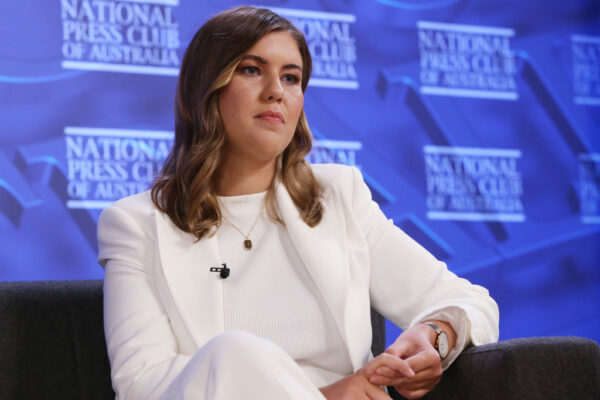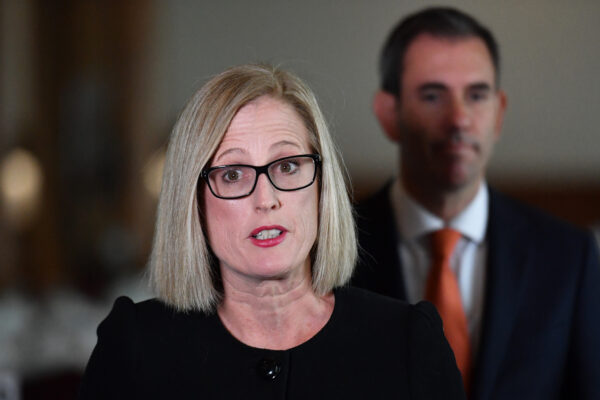Brittany Higgins’ Case Shouldn’t Have Gone to Trial to Begin With, so Why Did It?
Commentary The Brittany Higgins celebrity saga continues with the white dress she wore to a feminist rally being considered an addition to the collection in the Museum of Australian Democracy. But another key player in this circus isn’t doing so well. Only a few months ago, the Australian Capital Territory’s (ACT) Director of Public Prosecutions (DPP), Shane Drumgold SC, was walking around with the press hanging off his every word. Suddenly, he’s on shaky ground, with his role in the conduct of the trial now to be examined by a board of inquiry chaired by the eminent retired judge, Walter Sofronoff KC. It looks like this inquiry will be no whitewash. Sofronoff is a legal heavyweight, a former Queensland Solicitor-General and his inquiry will have similar powers to a Royal Commission. Have the powers that be decided that Drumgold is to be the scapegoat? A distraction from all the murky skulduggery that has taken place behind the scenes throughout the whole affair. Bruce Lehrmann’s lawyers have given numerous examples of what their client alleges is professional misconduct by Drumgold in a complaint made to the ACT Bar Council, sent after the trial was aborted. Lehrmann alleges Drumgold’s failure: to stop Higgins from giving an inflammatory speech after the trial was aborted, to take steps to remove Higgins’ National Press Club statements from circulation or seek removal of similar material from other media sources, and to provide sufficient warning to prospective witnesses that public comment could undermine the integrity of the trial. Brittany Higgins, a former Liberal Party staff member, addresses the media at the National Press Club in Canberra, Australia, on Feb. 9, 2022. (Lisa Maree Williams/Getty Images) The inquiry is required to determine whether “the DPP failed to act in accordance with his duties in making his decisions to commence, to continue and to discontinue criminal proceedings against Lehrmann.” Starting with the decision to commence proceedings, there’s material yet to emerge in relation to Drumgold’s decision to go to trial, despite being advised against this by the Australian Federal Police (AFP). Central to this issue is the Moller report—Detective Superintendent Scott Moller was in charge of the AFP investigation. After a four-month investigation of Higgins’ evidence, Moller concluded that “throughout the investigation, Higgins has been evasive, uncooperative and manipulative.” The report cites: Her repeated refusal to hand over her phone. When she finally did, she had deleted key evidence: “I’m clearing out my phone ahead of police,” she acknowledged. Her claim to have sought medical attention after the incident. The police travelled to Perth and Brisbane and found she’d misled them. She later admitted she’d lied about this. Her earlier text about wanting an impressive political sex scandal: “Exactly! A sex scandal the party can be proud of. Another Barnaby but without the baby, haha.” Her history of anxiety and depression: AFP officers wrote that they believed Higgins “is at risk of self-harm should this matter progress to prosecution.” The AFP concluded that “there were serious concerns in relation to the strength and reliability of her evidence but also, more importantly, her mental health and how any future prosecution may affect her wellbeing.” Given the immense pressure police are under in the current “#Metoo” climate to push rape cases to trial, it is very telling that the AFP would have made it so clear that it didn’t think that the case would stand up. Political Interference From Who? Relevant to the issue of why the case went to trial, Moller’s boss, The ACT Deputy Chief Police Officer Michael Chew, reported in his diary notes that “if it was my choice, I wouldn’t proceed. But it’s not my choice. There is too much political interference.” Lehrman’s lawyers played to the court an excerpt of a six-hour recording made in 2021 involving staff at Channel 10’s The Project that involved Higgins’s partner, David Sharaz. Higgins was allegedly present during the recording. In the audio, Sharaz is heard saying they wanted the story to break at the start of a sitting week of parliament and that he had a “friend” on the Labor side—Senator Katy Gallagher—who would “probe and continue it going.” Finance Minister Katy Gallagher and Treasurer Jim Chalmers during a doorstop at Parliament House in Canberra, Australia, on May 11, 2021. (Sam Mooy/Getty Images) The Weekend Australian reported that Senator Reynolds was allegedly warned by the late Labor Senator Kimberley Kitching that Labor was planning to “weaponise” Higgins’ allegations against the government. Consistent with this claim, Labor Senators Penny Wong and Gallagher tormented Reynolds with questions in the Senate about the incident, a total of 23 questions over three days, and Gallagher followed up with numerous questions in Senate Estimates. Now, Gallaher is the newly appointed finance minister and re

Commentary
The Brittany Higgins celebrity saga continues with the white dress she wore to a feminist rally being considered an addition to the collection in the Museum of Australian Democracy.
But another key player in this circus isn’t doing so well. Only a few months ago, the Australian Capital Territory’s (ACT) Director of Public Prosecutions (DPP), Shane Drumgold SC, was walking around with the press hanging off his every word.
Suddenly, he’s on shaky ground, with his role in the conduct of the trial now to be examined by a board of inquiry chaired by the eminent retired judge, Walter Sofronoff KC.
It looks like this inquiry will be no whitewash.
Sofronoff is a legal heavyweight, a former Queensland Solicitor-General and his inquiry will have similar powers to a Royal Commission.
Have the powers that be decided that Drumgold is to be the scapegoat? A distraction from all the murky skulduggery that has taken place behind the scenes throughout the whole affair.
Bruce Lehrmann’s lawyers have given numerous examples of what their client alleges is professional misconduct by Drumgold in a complaint made to the ACT Bar Council, sent after the trial was aborted.
Lehrmann alleges Drumgold’s failure: to stop Higgins from giving an inflammatory speech after the trial was aborted, to take steps to remove Higgins’ National Press Club statements from circulation or seek removal of similar material from other media sources, and to provide sufficient warning to prospective witnesses that public comment could undermine the integrity of the trial.

The inquiry is required to determine whether “the DPP failed to act in accordance with his duties in making his decisions to commence, to continue and to discontinue criminal proceedings against Lehrmann.”
Starting with the decision to commence proceedings, there’s material yet to emerge in relation to Drumgold’s decision to go to trial, despite being advised against this by the Australian Federal Police (AFP).
Central to this issue is the Moller report—Detective Superintendent Scott Moller was in charge of the AFP investigation.
After a four-month investigation of Higgins’ evidence, Moller concluded that “throughout the investigation, Higgins has been evasive, uncooperative and manipulative.”
The report cites:
- Her repeated refusal to hand over her phone. When she finally did, she had deleted key evidence: “I’m clearing out my phone ahead of police,” she acknowledged.
- Her claim to have sought medical attention after the incident. The police travelled to Perth and Brisbane and found she’d misled them. She later admitted she’d lied about this.
- Her earlier text about wanting an impressive political sex scandal: “Exactly! A sex scandal the party can be proud of. Another Barnaby but without the baby, haha.”
- Her history of anxiety and depression: AFP officers wrote that they believed Higgins “is at risk of self-harm should this matter progress to prosecution.”
The AFP concluded that “there were serious concerns in relation to the strength and reliability of her evidence but also, more importantly, her mental health and how any future prosecution may affect her wellbeing.”
Given the immense pressure police are under in the current “#Metoo” climate to push rape cases to trial, it is very telling that the AFP would have made it so clear that it didn’t think that the case would stand up.
Political Interference From Who?
Relevant to the issue of why the case went to trial, Moller’s boss, The ACT Deputy Chief Police Officer Michael Chew, reported in his diary notes that “if it was my choice, I wouldn’t proceed. But it’s not my choice. There is too much political interference.”
Lehrman’s lawyers played to the court an excerpt of a six-hour recording made in 2021 involving staff at Channel 10’s The Project that involved Higgins’s partner, David Sharaz. Higgins was allegedly present during the recording.
In the audio, Sharaz is heard saying they wanted the story to break at the start of a sitting week of parliament and that he had a “friend” on the Labor side—Senator Katy Gallagher—who would “probe and continue it going.”

The Weekend Australian reported that Senator Reynolds was allegedly warned by the late Labor Senator Kimberley Kitching that Labor was planning to “weaponise” Higgins’ allegations against the government.
Consistent with this claim, Labor Senators Penny Wong and Gallagher tormented Reynolds with questions in the Senate about the incident, a total of 23 questions over three days, and Gallagher followed up with numerous questions in Senate Estimates.
Now, Gallaher is the newly appointed finance minister and responsible for endorsing the mind-blowing decision to award Higgins up to $3 million (US$2 million) compensation after a hasty mediation process where the Albanese government stopped two key government ministers from attending and threatened not to pay Liberal minister Linda Reynolds’ legal fees unless she agreed not to participate.
According to The Weekend Australian, a key email from the Finance Department, which allegedly confirmed that all appropriate steps had been taken to protect Higgins, was not included in evidence contesting Higgins’ compensation claim.
Let’s hope Sofronoff sees this compensation as one of the “incidental issues” he is permitted to investigate and perhaps even refer to the new Anti-Corruption Commission.
Dropped Into Thin Air
There are also questions about Drumgold’s decision to abandon the trial, citing Higgins’ mental health.
Most of the media simply accepted this claim and then went on to report Higgins happily attending her degree ceremony within weeks of the trial and her boyfriend boasting that she had written four academic papers during court proceedings. She was photographed holidaying in the Maldives and offered to appear as a witness in the defamation cases launched by Lehrmann.
Social media was full of speculation about this miraculous recovery, but few journalists asked why the DPP didn’t simply postpone the case until Higgins recovered.
It is also remarkable how little public attention has been paid to the legal basis for the DPP’s decision to drop the case.
Normally the major reason to discontinue criminal proceedings is that there is no reasonable prospect of conviction.
Yet in the press conference announcing his decision, Drumgold expressly stated that he had “a clear view there was a reasonable prospect of conviction” before the start of the trial, and this is a view he “still holds today.”
With such questionable decisions central to Sofronoff’s investigations, perhaps the limelight-loving DPP will find his moment in the sun coming to an abrupt close.
Views expressed in this article are the opinions of the author and do not necessarily reflect the views of The Epoch Times.












